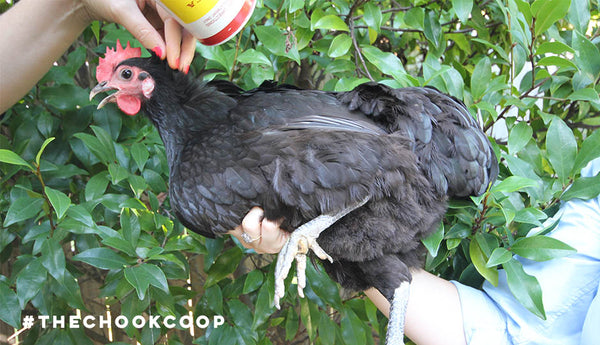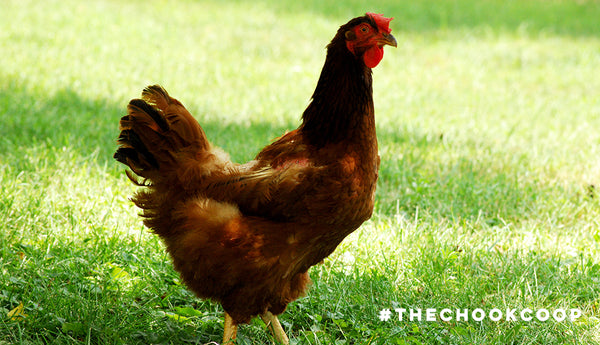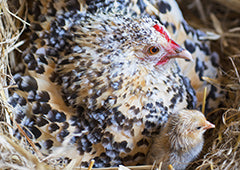Many owners feel stressed, anxious and betrayed when they open up their nesting boxes to discover not a single egg has been laid. They try to keep their cool for a few days, but each time they return to the empty nesting box a cold stab of failure stings their hearts, as they wonder, “Why, oh why?! What have I done? Why have my chickens stopped laying eggs?!” Some committed chicken lovers find this moment so distressing that they briefly develop hostile or contemptuous thoughts for their laying hens, while others put this perceived failure upon themselves and agonise over what they might have done to have to caused this travesty! The wisest chickens owners know that this is all a part of the natural cycle of a laying hens life and no eggs today doesn’t always mean no eggs tomorrow. So, rather than tear yourself apart with frustration and shame, read this brief article that will explain eight things that might be causing your laying hens to dry up.

1. The natural cycle of moulting will delay egg production
It’s quite natural for chickens to moult during the autumn months, such as March through to May in Australia. This is a natural process that causes all chickens to shed their feathers, as their body prepares itself to grow even more full and beautiful plumage. Over these months your laying hens will look slightly haggard and world-weary, however let me reassure you that this is an entirely natural and essential part of being a chicken. One of the important thing to note is that during this time you need to be vigilant and ensure that your laying hens are getting a balanced diet of protein (chicken feed) and calcium (shell grit). Other treats, like yoghurt, berries and porridge won’t go astray either, as they often contain helpful vitamins and nutrients that will help your laying hens through this sometimes difficult time. The upside is if your laying hens continue to lay after their moult it is likely that your chickens with lay larger eggs. So, don’t despair when your laying hens start to moult, just look at it as though your chickens are upgrading their egg maker.

2. Too much of the wrong food in their diet
To put it in slightly inelegant terms- fat chickens won’t lay eggs. There is the false perception between some well-meaning chicken lovers that a fat and happy chicken may in fact produce larger and more scrumptious eggs, however this is a total fallacy. Overweight laying hens, generally speaking, are quite unhealthy and their bodies won’t be able to function as they would if they were at the correct weight level. So, make sure that you only give your laying hens the right kinds of treats, as well as maintaining a balanced diet of chicken feed, shell grit and plenty of water.
3. Not enough time in the sun
Not all first time chook owners know that laying hens need plenty of time out in the sunshine, otherwise they are unable to produce their eggs. This is due to the fact that there is a gland that exists behind their eyes, which in response to sunlight produces certain types of hormones that cues the chicken’s body to begin egg production- that’s a very simple way of eggplaining it. Generally speaking laying hens require approximately 14-16 hours of daylight in order to produce eggs. This is why it’s so important for your laying hens to be let out of the coop early in the morning so that they can lap up the sun. The Auto Door is a perfect solution if you’re someone who prefers to stay in bed at six in the morning. Naturally, during seasons such as autumn and winter when there are reduced daylight hours, chickens may begin to lay less or stop entirely. Some breeders rectify this by introducing heat lamps and artificial light simulators, however this is left to the discretion of the owner, as some more organic farmers don’t feel comfortable playing with the chicken’s biorhythms.

4. Your girls might be getting a bit old
Average laying hens will begin to produce fewer eggs once they are 72 weeks old. They can continue to lay for one, two, maybe even three more years, but the eggs will gradually become fewer and fewer. At the end of the day there is no way from stopping laying hens from getting older but that doesn’t mean you have to stop loving them.
5. They may just be getting a little broody
There comes a time in every chicken’s life when they feel compelled to become a mother. As most chicken owners don’t allow their laying hens to spend some quality time with a rooster, some chooks get very confused and believe that their eggs might be fertilized. This is commonly referred to as broodiness and it often effect chickens for five to ten weeks. If you suspect that your hen might be getting a bit broody there are a few things that you can do, which you can read about here, which will help relieve some of the stress of what is basically a hysterical pregnancy.

6. Stress can distract your chickens from laying
Chickens may seem like tranquil creatures but during the laying season they are delicate and neurotic artists who need total concentration, otherwise they won’t be able to produce their eggs. There are things that can cause your laying hens to feel distressed and distracted, such as untamed dogs, over-excitable children, predators and enthusiastic owners who might be sticking their beaks into the nesting boxes too regularly. Additionally, moving your laying hens to a new coop or introducing new chooks to the flock can also stress your chickens out, which in turn will inhibit them from laying. It’s a good idea to delay any major changes that will directly alarm your laying hens to a time of the year when you don’t expect them to be laying anyway. Otherwise, you might miss out on the abundance of fresh eggs that normally rain aplenty though spring.
7. It may be a sign your chickens are suffering with mites and lice
If you’re still unsure what might be causing your chickens to stop laying you may want to consider taking your laying hens for a check-up at the VET. Firstly though, check to see if there are any mites or lice inside that coop or on their skin that may be causing them distress. If you do find some mites or lice simply clean out the coop and consider giving your chickens a wash, otherwise the mites will continue to torment your poor girls and you won’t be able to enjoy their scrumptious eggs.

8. Disease and discomfort will stop eggs in their tracks
There are a whole host of disease that laying hens can catch will often result in some terrible symptoms, which normally includes a reduction in egg production. Disease include avian leukosis, lymphoid leukcosis and
coccidiosis. Most disease will often result in your chicken experiencing a period of diarrhoea, which is characterised by excess mess around the chicken's vent. Once again, in the event you notice any typical signs of symptoms, which can include uncharacteristic reduction in eggs, please contact your local VET.
Most of the time laying hens cease to produce eggs temporarily or permanently for a number of natural reasons, such as age, season or moulting. Though many of us wish our laying hens would cook up delicious eggs for us for many, many years, this unfortunately is seldom the case. The best thing you can do is relax, accept the reality and show gratitude to your laying hens, which have worked very hard for you for 72 weeks or more to prepare fantastic, nutritious and delicious eggs for you.
One way to keep your laying hens stress levels to a minimum is to ensure that they have a safe and strong coop, like the Taj Mahal, Penthouse or Mansion. Inside these chicken coop castles often exist the happiest chickens that lay the tastiest eggs.
We all want to help our egg-layers lay the best eggs and know the best ways to take eggcellent care of our feathered friends. It's essential that you've got the right expertise you need to raise happy, healthy chooks. Did you know 67% of chicken keepers surveyed experienced a chicken health or behaviour issue in the first 12 months that they didn’t know how to handle?
But don’t worry! Our feathered friends over at Chickenpedia have created a Chicken Healthcare Course. It is a comprehensive online course that includes everything you need, including what to look for in an unhealthy chicken and how to support your egg-laying hens to optimal health.
In order to get a frequent, fresh supply of eggs, keepers need to look after the chickens that lay them. There can be multiple issues that are stopping your ladies from laying which is stressful for them and for you! Don’t worry though – the eggsperts at Chickenpedia have cracked it once again! Their Eggs in Your Basket course will help you, help your ladies lay successfully. Discover crucial information to keep your chickens happy, healthy, and frequent layers. All your egg questions will be answered in this extensive course. From double yolkers, to soft shells, not eggs, to odd eggs, Chickenpedia cover it all!
All of their courses are really well structured and filled with vital knowledge, which is why I highly recommend them to all of my readers! So, check out Chickenpedia today!
If you are interested in reading about more way you can get more eggs from your laying hens, simply click here.

















